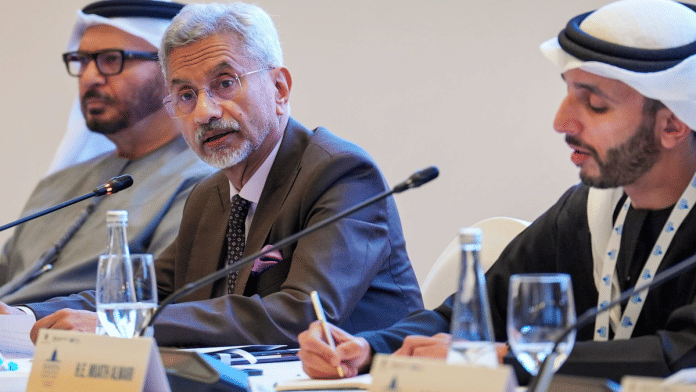New Delhi: External Affairs Minister S. Jaishankar Tuesday called for closer cooperation and collaboration between India and West Asia, and also warned that the recent changes in US foreign policy may foster more competition in the world.
Jaishankar was addressing the inaugural session of “Raisina Middle East” in Abu Dhabi, an extension of India’s premier conference on geopolitics and geoeconomics, “Raisina Dialogues”.
He said, “As we contemplate the world ahead, it is important that we read the incipient trends accurately. A significant one is the belief in key circles in the US that its true potential has been hobbled by regimes and restrictions. Such perceptions have been fuelled by assessments that others have gamed the international system to America’s disadvantage.”
The minister, who is in the UAE for two days, said the competitive facet of world affairs was likely to increasingly overshadow the collaborative one. “Finding common ground and landing points will not be that easy, or indeed, that lasting. In such a scenario, the global architecture will also be more plurilateral. Combinations of nations will come together on an agreed and specific agenda,” he said.
Jaishankar’s warning of a more competitive US upending the current global order comes at a time when Trump has already taken aim at several countries, including Canada and China, for their large trade deficits with America.
Trade deficit or subsidies?
In his first official call with Indian Prime Minister Narendra Modi Monday, President Trump urged New Delhi to ensure a “fair” bilateral trading relationship. The US is one of India’s largest markets, with exports of goods touching $77 billion in 2023-2024, according to the Ministry of Commerce and Industry.
India, however, imports around $42 billion worth of goods from the US – a $35 billion deficit in New Delhi’s favour. Trump has famously called such deficits “subsidies”, especially in regards to Canada, a long-term US ally.
In 2023, Ottawa exported roughly $594.5 billion of goods to the US, while importing only $373.7 billion. Trump has criticised this, arguing that the amount was equivalent to a subsidy, and that a number of products from Canada could instead be produced in the US, including cars and lumber.
The US President Sunday also threatened a key security partner in South America, Colombia, with tariffs and sanctions, if it did not accept its nationals deported from the US. The US is Colombia’s largest export market, and the South American country also imports most of its goods from the North American country.
The threats by Trump to leverage the US’s commercial power has forced countries from around the world to change its global economic policies. The Indian foreign minister’s remarks in Abu Dhabi indicated regions where India was looking to deepen its economic footprint.
“By every yardstick, this (West Asia) is a region crucial to India’s strategic interests. Many of you would be familiar with the intensity of India’s ties with the Gulf. Our trade is in the region of USD 160-180 billion annually. The energy dimension is the most visible; but there is much more to it than that,” said Jaishankar.
Moreover, the Gulf was home to roughly nine million Indians who lived and worked in its countries, he added.
Also Read: Pakistan watches Trump 2.0 with ‘caution’, PTI sees chance for Imran Khan’s release
Connectivity key for future cooperation
The foreign minister also made the case for closer cooperation between New Delhi and the West Asian region through connectivity projects, such as the International North-South Transport Corridor (INSTC) and the India-Middle East-Europe Economic Corridor (IMEC).
“Refashioning connectivity cannot be a unilateral enterprise if it is to be effectively utilised. Currently, there are some initiatives underway that will unfold in the coming years. The IMEC and INSTC are the two most notable in this region; and India is involved in both,” he said.
The INSTC is a project which envisions a connection between India and Russia via Central Asia and the Caucasus. IMEC, which was first announced in September 2023, would see a transport route to the Mediterranean from India via West Asia.
The US, under its previous administration of President Joe Biden, was one of the largest supporters of the IMEC project, which was announced in New Delhi on the margins of the G20 Leaders’ Summit.
IMEC, however, has been held up due to the conflict in Gaza between Israel and Hamas, while INSTC faces several challenges, including Russia’s war with Ukraine.
In the East, India has also been constructing the ambitious India-Myanmar-Thailand Trilateral Highway (IMT Highway), connecting Manipur with Thailand. The project has also faced many challenges, including the ongoing civil war in Myanmar.
(Edited by Tikli Basu)
Also Read: Trump is more about drama than change. His power ends where states push back






